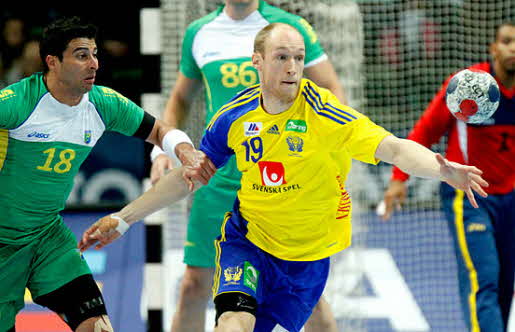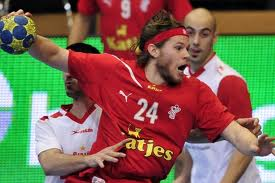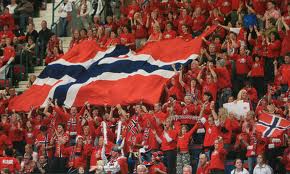The first day of games in the three groups did not offer any real surprises. Perhaps some will think that Algeria and Brazil offered more resistance than expected, but the opponents were most likely prepared for a battle. Here are some observations, based on web reports and input from people who were present:
Sweden did manage to win against Brazil with 25-20, but it was not an impressive victory. The attack was characterized by mistakes and the defense leaked. So the goalkeepers Palicka and Sjostrand deserve a lot of credit. The result was 16-16 at one point in the second half, but then came the decisive Swedish move to 20-16. Sweden had success with fast-breaks but they were a disastrous 1 for 5 from the 7-meter line. Brazil were hampered by very erratic shooting from distance. The conclusion is that Sweden must play much better to have a comfortable time against FYRO Macedonia tomorrow.
This was also confirmed in the Hungary-FYROM matchup, where the Hungarians fell behind from the beginning and did not manage to assert themselves until some strong shooting from oldtimer Carlos Perez gave them a chance to pull ahead late in the first half. From there on they managed to maintain a slim lead. The final result was 28-26 for Hungary, after some drama near the end, when FYROM had a chance to tie the game. Hungary got a large number of 2-minute suspensions, but despite good efforts by playmaker Mojsovski, FYROM did not manage to take advantage. This game may well turn out to have been the critical one in the group.
Poland seemed to get a solid start against Algeria, but soon they found themselves behind and the half-time score favored the Algerians, 16-13. Szmal had started the game without much success, so a switch to Wichary may have been decisive. And then, during a ten-minute period early in the second half, the experienced Polish team got the game under control with a partial score of 9-2. From there on they were never really threatened, and with the Jurecki brothers showing the way, they built the lead to 28-22, before Algeria managed to score the last five goals of the game for a 28-27 final result. Poland’s strength was in efficient scoring from the 6-meter line and the wings, while the Algerians undermined their cause through some wild shooting.
Spain is in what seems to be the toughest group, but at least they have home court advantage in Alicante. The Spanish team had also made rather confident statements ahead of time, suggesting that they are simply too good a team to miss out on the Olympics. But the game against Serbia turned out to be just as difficult as the strong performance of Serbia in EURO 2012 would suggest. The half-time lead for Spain was 11-10, after a nervous start from the home team and a gradual comeback. In the second half it was very close until a few minutes from the end, and Serbia had the lead a couple of times. Ilic was the outstanding scorer for Serbia, although some of the goals came from the 7-meter line. The Spanish scoring was more evenly spread, but the tradition held up, with many successful fast-breaks and a lot of shots attempted from the wings.
If from the game Croatia-Japan one first noticed the half-time result, 16-14, one may have begun to wonder. But a closer examination shows that the Croatians had a 12-6 lead before they relaxed. And in the second half there was never any doubt. The home team pulled away to 28-17 and kept up their concentration to the end. The final result was 36-22. It was telling that 47 of 51 shots from the Croatians were on target, with Cupic and Horvat as the top scorers. Alilovic and Losert had an easier time as no less than 18 of 53 Japanese shots were blocked or went wide. It just is not enough to score eight goals from distance in international competition.
It had been generally assumed that Chile is the weakest one of the teams participating in the qualifying. Against this background, a final victory for Iceland with 25-17, after 12-7 at half-time does not seem so overwhelming. But Iceland in fact had the lead by 20-9 and 24-12, so the win really came more easily than the final result suggests. One factor was that Chile had far too many turnovers, and they also failed to take advantage of a large number of Icelandic 2-minute suspensions. Sigurdsson dominated the scoring for Iceland with ten goals, many of them on fast-breaks. Chile also allowed too many penetrations on the 6-meter line. None of the Chileans managed to score more than two goals.
It would not be a complete surprise if all the groups are decided on the second day, causing the games on Sunday to be meaningless. But let us hope that we get at least one unexpected result tomorrow! At least it is difficult to see Poland as clear favorite against Serbia, and perhaps the Swedish group will also see an upset…

















